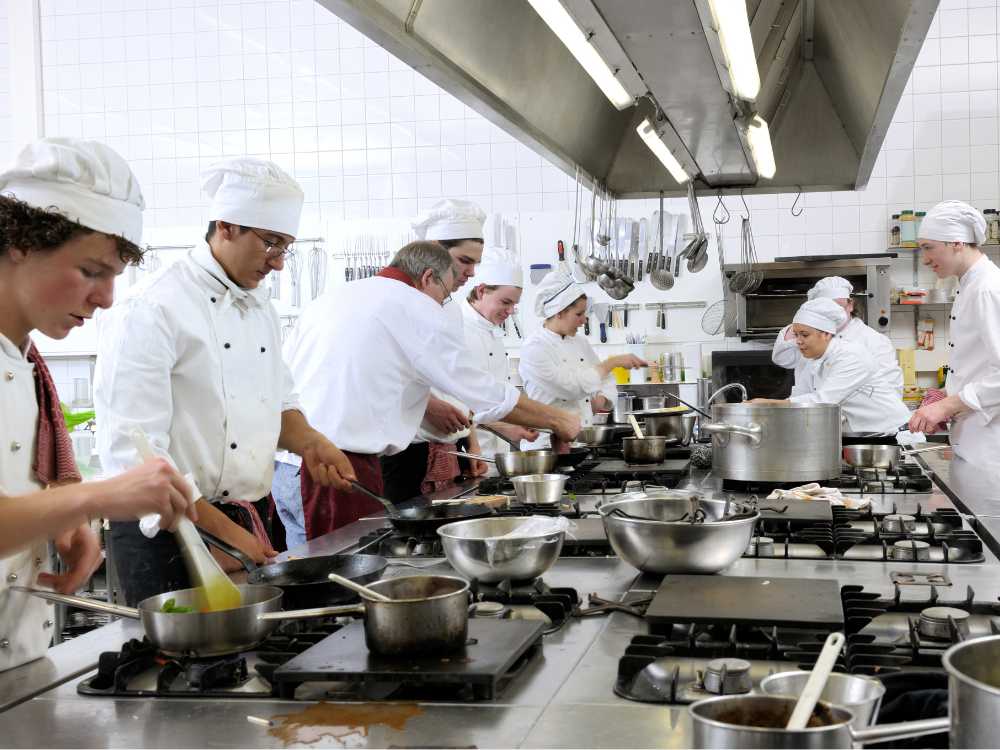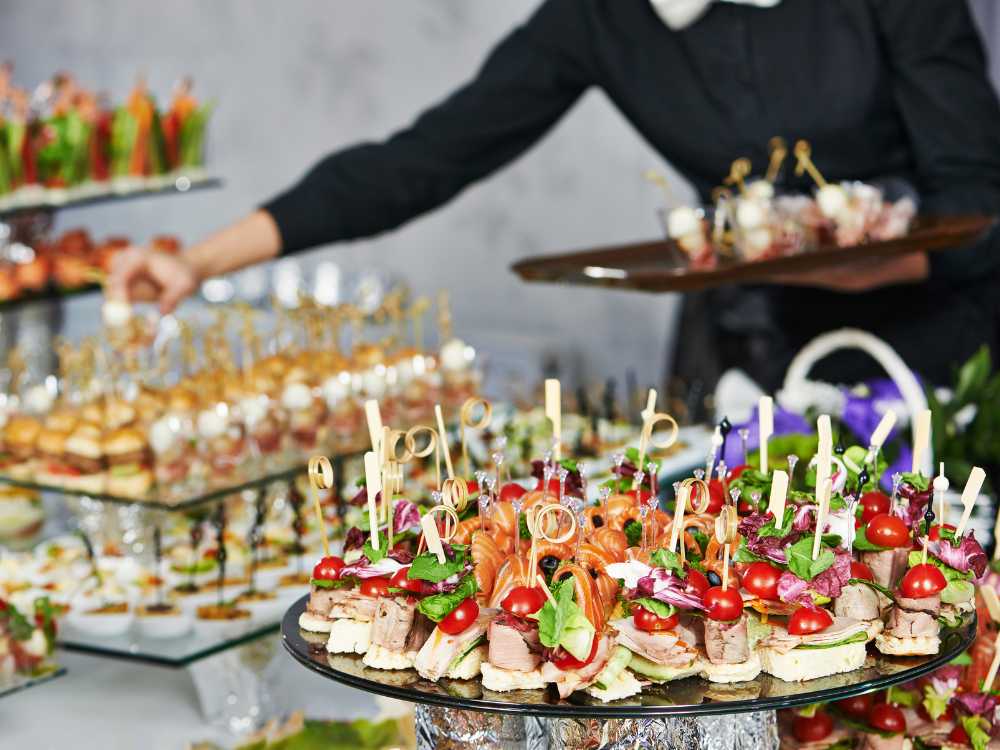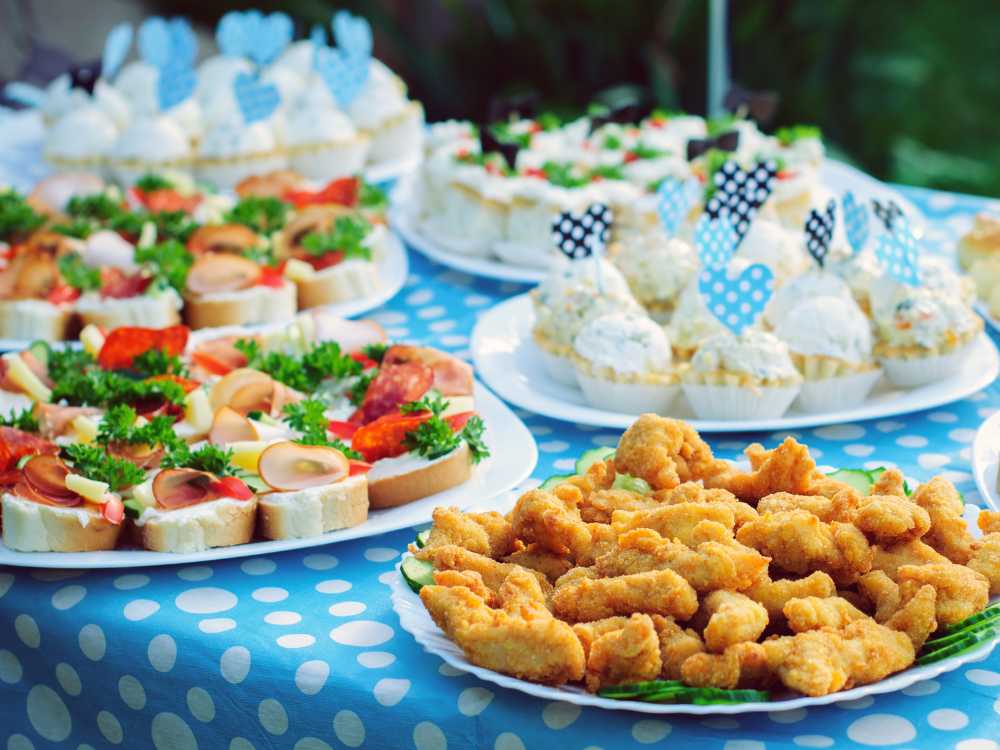What is Catering – Who Are Caterers & Types of Catering Services
The question ‘what is catering’ is not supposed to be a topic of confusion.
But, the fact that caterers are highly mistaken for cooks, restaurant servers, and bakers; makes this topic worthy of research. So what is catering?
Catering, in a simple definition, is when a person or a business provides food and drinks for an event or a party.
Caterers are well-trained in the etiquette of meal preparation, meal presentation, the nutritional balance of the meal, aesthetics, and so on.
Usually, caterers work with contracts, while cooks, servers, and the rest work with repetitive orders.
Caterers start from the inception when preparing meals, while the others have already-made dishes waiting for personalized requests.

Who Are Caterers and What Do They Do?
Caterers are people that work in a catering business. Their roles include menu development and food preparation (especially from scratch).
It also involves the transportation of meals from the cooking site to the event, serving, and clean-up.
Caterers usually have numerous vendors responsible for many of these services.
Some catering vendors help by providing glassware, plates, pots and pans, rentals, clean-up, decorations, and many more.
Since one of the roles of a caterer is to prepare food that is enough for the number of guests expected, budgeting is highly required.
While the food should be sufficient for all the guests, caterers should prevent too much excess to avoid wastage of food, resources, and money.
A caterer is also well-trained to understand the numerous food types requested at different event sites.
Though some caterers do all cooking, many services prefer to include team members that can handle the several cooking departments.
The following are different caterer types and what they do.
1. Wedding Caterers
They bake the wedding cake, design the food and cake table, create a food buffet, manage reception cocktails, etc.
The services required during wedding catering could include baking, decorators, wedding coordinators, winemakers, etc.
2. Corporate Caterers
Their role includes food preparation, serving, and cleaning up of breakfast and lunch menus for formal events.
The services required during corporate catering include bakers for cakes and pantries, baristas, chefs for light meals, etc.
2. Social Event Caterers
Their roles are similar to wedding caterers but more fun and casual.
The services required for social event catering include bakers, chefs, event coordinators, etc.
3. Concession Caterers
These people don’t necessarily prepare the main dishes. Instead, they make appetizers and desserts such as BBQ preparation, ice creams, pastries, etc.

What’s a Catering Service?
A catering service is a business that provides food and drinks to a site. The location/site can include a studio, festival, park, event, aircraft, hotel, hospital, etc.
Unlike the classic-catering meaning, catering service providers are employed under an institution to render food and drinks to guests.
When it comes to owning a catering service, ensure you get a lawyer and an accountant to help handle your business’s legal and financial proceedings.
Getting insurance is also not a bad idea. To start a catering business, follow the steps below.
01. Pick Your Department
As seen in the previous section, there are four departments of catering services; wedding, corporate, social events, and concession catering.
Among these four catering types, pick what department you want to try. While choosing, consider your experience in that aspect and your level of training/staffing.
02. Settle on a Name
What is a catering service without a name? The next step is to find a name that you would use to set up your social media account, email address, and website for accessibility.
03. Draft a Business Plan
While this sounds easy to the ear, it is a lot of work. You need to detail an overview of the department you are entering.
Further, you’ll need a market analysis of the demand and supply of that service in your area.
Not only that, but you also should find out and outline the products and services expected from you and so on.
Stand firm on your finance and capital options because doing so will help you decide whether or not you’ll get an SBA loan or rely on your savings.
04. Registration and Licensing
Get accustomed to the rules and regulations surrounding food safety and handling. Also, get a license to start a food business.
For this reason, you might need to contact your state’s health department, IRS (for taxes), EIN providers, etc.
05. Decide on Your Pricing
Next, you need to decide how much you want your services to be. Base your pricing on the duration of coverage, packages, or menu.
It would be best to use a competitor’s list to guide yours, especially if you don’t know where to begin.
Though you might try to beat down your prices, make sure you don’t compromise on quality and that you also put the current food economy in mind.
06. Hire a Team and Advertise Yourself
Finally, staff up your business according to your department and begin work on business marketing and promotion.
Run ads, network with other caterers in the industry, advertise yourself and do all you can to put yourself out there.

Understanding The Catering Industry
The question of what’s a catering service now has an answer. What about the catering industry- what is it?
It is a sum of all the available services and vendors under the different catering departments.
Here, it is no longer concerning catering services alone but everything that helps make the role of a caterer possible.
The people or jobs available in the catering industry are involved in either of the following:
| Involved With Food and Drinks |
|
| Involved With Supply |
|
| Involved With Logistics |
|
| Involved With Management
|
|
| Involved With Health and Inspection |
|
Types of Catering Services
All catering services begin by scheduling a meeting with the proposing client, then they’ll agree on the type of menu and the price for their services.
However, the menu and process are not the same for every event. Many caterers have to do different things depending on the catering type or service.
Where a wedding would require an 8-tiers wedding cake with pearls and lace, a conference would need coffee, crackers, and a light meal. So what are the types of catering, and what do they do?
1. Wedding Catering
Wedding caterers need good communication, detailing, timing, and planning.
Apart from cooking and serving, they also need to know about table and food decorations, dietary and general food allergies, staffing and table set-up, and so on.
Good wedding caterers could also offer wedding planning and coordination as part of their packages.
2. Corporate or Formal Catering
Here, the caterers prepare meals for formal functions like board meetings, conferences, product launches, conventions, etc.
The service excludes aesthetics, decorations, and an event theme. Then it focuses primarily on elegance and a laid-back meal. The role of a caterer in this division is to serve and clean up afterward.
Usually, corporate caterers don’t smile as much as wedding caterers as they are more formal with a professional outlook.
3. Social Event Catering
Social event catering is for birthdays, bridal showers, burial ceremonies, baby showers, etc.
The caterers prepare an appetizer, do decorations, attend to bar-tending, and serve the menu to the guests. Outdoor BBQ could also be a component here.
The only reason social event catering is different from wedding catering is that things are relaxed and casual during social event catering.
4. Concession Catering
Requested for live concerts, sporting events, and the rest, these caterers make light meals based on orders.
Nonetheless, it is only on rare occasions that they prepare full-blown dishes.
The included menus are hot dogs, hamburgers, chili cheese fries, and other casual foods.
Their guests can either be large or small, so budgeting is still a necessity here.

Tips To Operate a Catering Business Professionally
Though many certifications and training can make a caterer seem professional, true professionalism lies in skills and presentation and the ability to follow instructions.
The other skills required by a professional caterer include timely (polite) customer service and business acumen.
Expertise in organization and cooking (which does not have to be handled by you) is also essential.
Further, a professional caterer needs to be a master of menu knowledge (creating a balanced and satisfying menu). Lastly, an understanding of how food logistics work would also be necessary.
As a beginner, these tips can help you get started:
- Refrain from handling all the departments yourself. Outsource and rent some divisions
- Have a signature dish that you can cook very well
- Make some dishes ahead of time and store them well
- Monitor food temperature
- Having insurance – makes you more professional
- Prioritize hygiene and food safety
- Network with event coordinators to help fine-tune your catering to fit into the event’s theme
- Learn how to present foods beautifully
- Be online and active
- Join a professional organization
- Have a structure and up-to-date documentation of your process and paperwork
- Pack leftovers immediately
- Dress well or incorporate uniforms
- Remember that you are a business
People Also Search
What Does Catering Mean?
Catering is the process of providing food and drinks of all sorts for an event or an on-site location based on a contract with a catering service.
They begin with planning the meal that will be prepared, to the presentation and serving of the meal, then to the clean-up.
They differ from restaurants because their meals are tailored to the requests of the clients and not made off of ready-made dishes.
What Are The Main Types of Catering?
Catering can be divided based on the site of the catering service or the kind of event hosted.
Based on the location, it includes on-site and off-site catering, where off-site caterers usually have their kitchen somewhere else and then transport the menu to the event location.
Based on the event hosted, the types of catering include wedding, corporate, social events, and concession catering.
What Do Catering Companies Do?
Catering companies deliver a client’s catering needs within a deadline and budget.
Their services go from those involved in the cooking to those that provide the food. It also includes logistics and managerial positions.
While there are many job opportunities involved in the catering industry/company, the qualifications needed for each event differ.
What Skills Are Needed For Catering?
To be a top caterer in your field, have a strong customer service team, food preparation and presentation expertise, and a friendly attitude.
You also need to understand the concept of budgeting, food handling, and event monitoring.
Finally, if you put personal hygiene, food safety, and event monitoring into the picture, you’ll be better off.
Final Thoughts
Catering is (in too many ways) likened to cooking for a restaurant or having a food truck where you serve delicious foods on order.
Just as the difference between a cook and a chef, the true catering meaning is more technical. Catering only happens when a client makes a request.
Then the food and drinks will be made from scratch and tailored to the client’s needs. A caterer is not involved in only cooking, as many believe.
A professional caterer handles all the departments, from menu planning, preparation, storage, presentation, serving, transportation, and clean-up.
